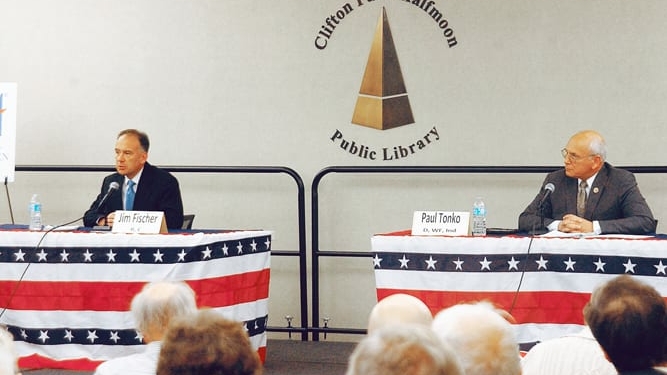Job creation and growing the economy are crucial issues for residents of the 20th Congressional District, according to both candidates. However, they share diverging opinions on how to achieve those goals. Incumbent Paul Tonko, D-Amsterdam, and challenger Jim Fischer, R-Ballston Spa, each laid out their case for why voters should cast ballot for them on Election Day during a League of Women Voters candidate forum Thursday, Oct. 23, at the Clifton Park-Halfmoon Public Library. About 100 people turned out to the debate, with questions submitted from attendees and a panel of media representatives. It was the second of three scheduled debates. The final debate was held Tuesday, Oct. 28.
Fischer said that over the past several months, he has meet with district residents and has heard his concerns being reflected. “They really come down to some great concerns that people have that our economy, six years after the start of the great recession, continues to stagnate. … That’s not adequate to create good-paying jobs and grow income the way we need to,” said Fischer. “I believe that we will do better if we change directions.” Tonko echoed Fischer’s observation and said creating jobs remains vital for the region.
“The people of this great district have formed their priorities, chief amongst them jobs. The opportunity to work and the dignity to earn a paycheck,” said Tonko. “It’s also about growing and protecting the middle income community.” Tonko pointed to public-private partnerships as way to grow clean energy, high-tech and innovation-based job growth. He said investment in research is “incredibly invaluable,” alongside investment in primary and higher education. “It is not about cutting our way to prosperity,” said Tonko. “We cut where we can so we can invest where we must.” Providing incentives to manufacturing in growing industries, training workers for such jobs and emphasizing exportation will grow local businesses, according to Tonko. Fischer would opt to take government investments out of the equation and focus on helping companies grow themselves through tax reform and regulatory reductions. “Public-private partnerships, what that means … is crony capitalism. That’s when the federal government gets to decide where your money is spent,” Fischer said. “They take your tax dollars and decide who the winners and losers are going to be.” Fischer, too, placed importance on growing alternative energy to help the country reach energy independence. Tonko said industries are heavily funded by government in other countries, much more so than the United States. “Telling businesses to fend for themselves” places them at a competitive disadvantage, he said. Fischer said the proposed carbon tax would depress the economy and ultimately impact working class and poor communities. He said other developing countries continue opening new coal power plants and have not agreed to levels our country has already reached. “What (Tonko) is saying we should do is hamstring our economy, hurt seniors, hurt the poor, hurt middle class families, so that we can try to pull the rest of the world along with us,” said Fischer. “They need to step up to the plate and do their part before we try to do more than we are able to do … because we are not being followed.” Tonko said the Department of State is working on a 20-country collaborative, with the 20 largest economies internationally, to tackle climate change. Hydraulic fracturing seemed to be an issue where the two somewhat met, both agreeing if it can be done safely then it should be pursued alongside local control of the activity. Tonko said he believes the country is transitioning from an oil-based economy to a “water-based economy,” so water resources should not be comprised. He urged for diversification of energy production and consumption, which would be tackled best through a comprehensive energy plan. “If you are pumping those chemicals into someone’s community, into their environment, the community has a right to know,” said Tonko. “There needs to be a set aside for any damage that may occur. That’s a huge bit of contingency fund that is required.” Fischer said fracking is being done safely in 34 out of 35 states where such activity is occurring, but maintaining clean water and securing such sources must primary. “We’re moving in the direction of energy independence, and that is going to have tremendous positive benefits for our economy,” Fischer said, “so we need to continue encouraging that, and I think we need to make sure though, however, that we are doing it safely.” The candidates diverged again on gun control legislation. Fischer said there are “sufficient” federal laws addressing firearms, but Tonko suggested more could be done. “I’ve always said a trigger don’t pull itself, so the problem is the person who is holding the weapon,” Fischer said. “It is their state of mind … that needs to be addressed.” Tonko pointed to a vast majority of gun owners who support strengthening background checks and the need to bolster mental health services. “It is a mix of a response to doing all we can as a society to respond to our individuals and families,” said Tonko.
Paul Tonko, Jim Fischer see different paths
Leave Comment



